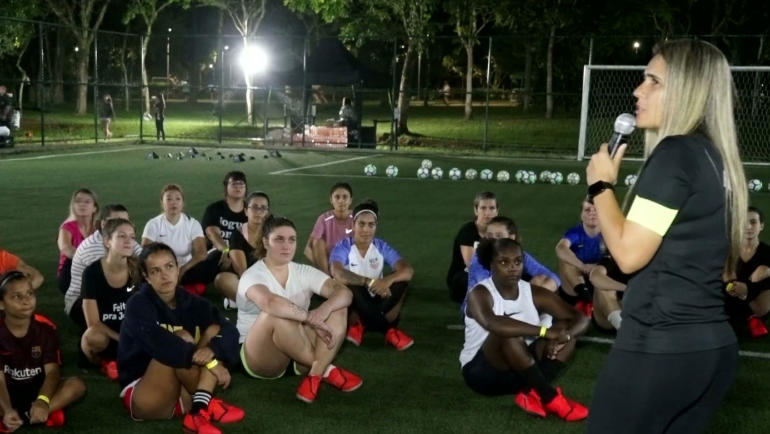Female football players from around the world are heading to France to battle for the Women’s World Cup.
They’re hoping the attention the contest brings will help level the playing field with their male counterparts. In Brazil, a new law is aimed at doing just that.
CGTN’s Paulo Cabral has details.
This is a woman’s only training facility in Sao Paulo. It was set up in advance of the Women’s World Cup Football tournament, as part of an effort to boost the sport here in Brazil.
“We have to play in public places that are usually dominated by male players,” said student athlete Paola Reola. “Often, they don’t want to let us play.”
“Boys think they’re the only ones who can play football,” said Clara Helena. “So when we play with them they never want to pass the ball to us. Until they realize we can play as well as them or even better, and usually we play better.”
This former coach of the Brazilian women’s national team, now the head of the Santos Football Club, leads the training here. Emily Lima says the mandatory creation of women’s teams in Brazil’s Premier League — effective this year — was a good start, but it’s not enough to create real momentum for the sport.
“There’s a lot of talk that that things are improving for women’s football but what about working conditions for the women? Will they get only the leftovers? There are some big clubs with women’s teams now, but the women’s teams still mostly get the crumbs.”
The creation of new women’s teams has been welcomed as an important step in developing the sport, but in most cases these are amateur teams that do not pay full-time salaries. So while there may be more opportunities for women to play, there are very few avenues for them to become professional athletes.
The Corinthians Football Club is among a handful of teams which already had a professional women’s team in place ahead of the new regulation. The club director hopes other teams and leagues will begin paying more attention to female athletes.
“We already have an important women’s tournament here in the state of São Paulo and there are other state leagues that have been trying to boost their tournaments,” said Cristiane Gambare, the director of the Corinthians Football Club. “This hasn’t been happening only because of the new rule mandating women’s teams, but also because there is a new market being created which will continue growing over the next few years.”
Adriana Leal is a striker at Corinthians who was scheduled to play for Brazil’s national team in the World Cup until an injury forced her to the sidelines. She hopes female athletes are up for the challenge.
“I felt a lot of prejudice when I was young,” she said. “I almost gave up on football because of that. When we played, I would hear from the boys, ‘it’s wrong to have a girl playing with us; it won’t work.’ This is the kind of thing women still hear every day.”
While Brazilians love their football, equality for men and women players still has a ways to go.
 CGTN America
CGTN America

